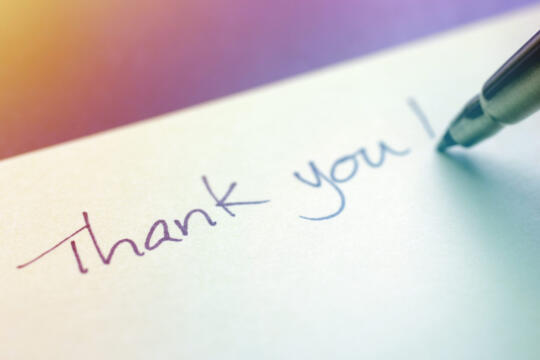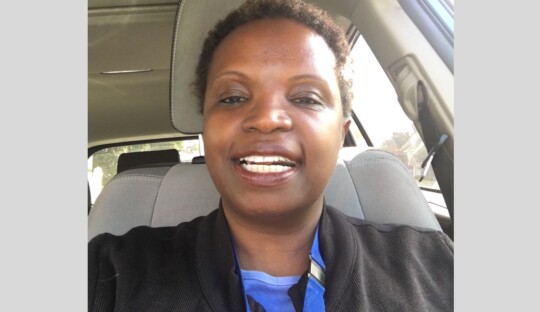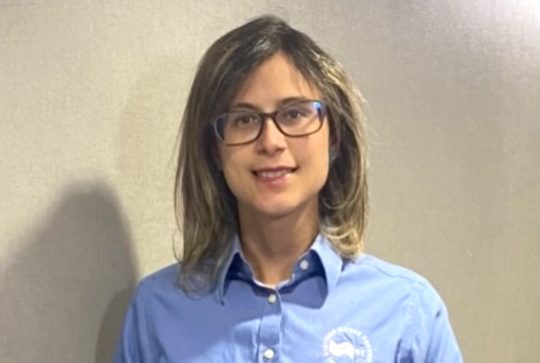VNSNY Community Mental Health Expert on Ground to Aid Victims of California Wildfires
Kerry Symon, Associate Director of Programs and Clinical Operations for VNSNY’s Community Mental Health Services, recently spent a week with the Red Cross, providing behavioral health support for people displaced by the wildfires in Northern California. This is Kerry’s report on her time there, as given by phone to one of our writers.
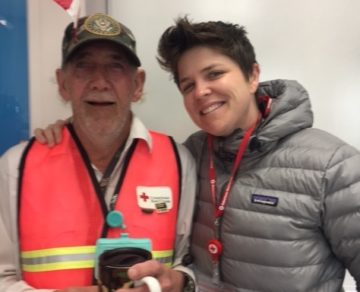
When I first arrived here, you could see the smoke filling the sky. Now, a week later, the fires are 90 percent contained, but they’re still going, and every morning when I wake up it smells of smoke. My first night here, I stayed in a Red Cross staff shelter that had been set up at a race track. It was just a big room filled with a lot of Red Cross cots. It was an adjustment for me, but I also realized that it was a sliver of what other people affected by the fires were experiencing—sleeping on a cot with a blanket I’m not used to, surrounded by people I didn’t know. The next day our group moved to a motel in Springfield, California, where we’ve been based ever since.
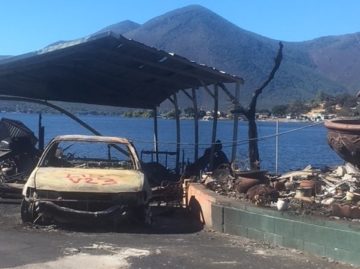
For the first several days we traveled around doing mental health needs assessments, both of fire survivors and also of our own Red Cross responders who are community members and have sometimes lost their homes themselves, but are so focused on helping others that they aren’t really looking out for their own health care. Our job is really to provide psychological first aid—assessing fatigue and trauma, and checking for any problems people might have sleeping or eating. The idea is to spot problems and address them and also connect people with longer-term care if needed, so that any stress-related issues don’t become chronic.
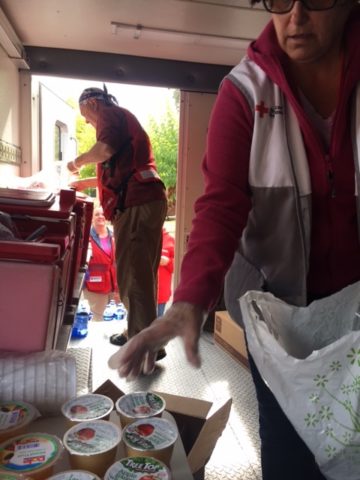
We spent one of those days in Napa County, going around with the Red Cross emergency response vehicles, which were visiting affected communities giving out food. We visited a mobile home community that hadn’t burned, but people had been displaced from their homes for a time, which is also stressful. People had lost their food, they were without electricity, and many had lost wages because the fires had shut down their jobs. We checked on one woman in her early 60s, who had gotten spinal surgery a week before the fires, and then had to be evacuated. She was still homebound, so we provided her with some food from the food truck, and made sure she had her necessary therapy appointments scheduled. She had a daughter who was checking in on her and didn’t need extra resources, but it was a stressful time for her—so the fact that we were able to confirm she was okay was important. We drove around the whole community checking on people that way, giving out food pantry information and simply talking to them, listening to their stories and validating their experiences, as well as keeping our ears open for any level of distress that could warrant further intervention.
The last four days I’ve been working in Lake County, in a town called Clear Lake. It’s actually one of the poorest towns in California, and they get hit with wildfires frequently. There are some people here for whom this is the second or third time their home has been burned down. It’s pretty awful. A lot of our behavioral health team for the Red Cross is up here, because of the lack of resources and because the need is so great. I was just speaking with a woman who was already homeless, but the residence she had been placed in as a homeless person was burned out. So now she’s looking for a place to stay, and there’s no existing homeless shelters in this county. You can imagine the impact this type of disaster has on this community, on top of all the other things they have to deal with.
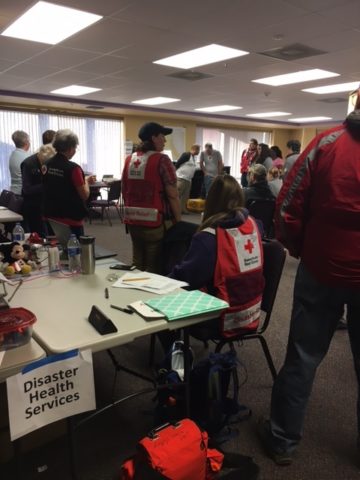
Where I’m working is called a LAC—a Local Assistance Center. There are tables here with representatives from FEMA, the Salvation Army, unemployment, veteran assistance, social services, and the Red Cross, so it’s a one-stop shop. The LAC is set up in an adult day care center that the county made available, and the media has been spreading the word, telling people to come here. One gentleman I’ve been helping for the last several days moved here two years ago from Oklahoma. He set up his home here with his girlfriend and two kids—and then, right before the fire, his girlfriend and kids left him, and then his house burned down. He’s a Gulf War veteran, and he’s experiencing a lot of shock symptoms and still processing what happened. When I first met with him, he was having trouble keeping things together. Immediately after a disaster like this, people have to be very solution-focused: they need to figure out how to get shelter, and get hold of some money, and it’s really hard for people to do this under such duress.
Since we first met with him, we’ve been tag-teaming with the emergency services and the other resources here to help him out. He’s staying with his mom right now, but he can only stay there temporarily because she lives in Section 8 housing, and when you live in Section 8 you can’t have other people living with you. We were able to allow him to stay a little longer with his mom until his FEMA rental assistance comes through, which takes a week. Working with the Red Cross case worker, we got him a card so he could use it to buy some gas, which meant he was be able to drive back here for a follow up visit. We also got him a $250 Red Cross card that he can use to get money from an ATM. With these steps, his stress decreased. When I saw him again today, he was much better. He is basically resourceful, and after he calmed down he was able to tap into that and consider the next steps he can take. That’s the mindset we want to get people to. Often a preexisting resourcefulness and resilience is there—it’s just covered up by all of this survival stress and shock following a disaster.
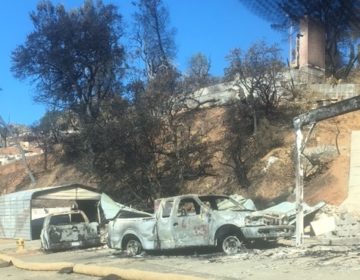
Another woman in her late 60s came into our LAC yesterday. This county is situated right on a lake, and she’d been living in a small mobile home community on a little peninsula in the lake for 32 years—and now everything’s gone. All the mobile homes burned, they’re completely decimated. Everything she owned is completely gone. She came in yesterday with a friend, just sad and in shock. A couple of days before, she had been in her home celebrating her birthday with her friends. Next you know, everything is gone, even her car. What happens with the fires is the fire sometimes jumps. Right above this community is a mountain, and the fire just jumped the mountain onto this peninsula and the community went up in flames. This woman showed me a picture of a guy trying to pull out a storage trailer with his car, and he had to just jump out and go. The car just burned, right where he left it. Some of her neighbors didn’t evacuate in time and had to run to safety right at the very end.
She’s staying with a friend temporarily, who was there with her, walking her around the tables. She had really good housing insurance and she’ll also qualify for FEMA rental assistance. But she kept repeating, “I can’t believe everything’s gone, my pictures, my clothes”—going through all the memories that she had in the home. So that’s what I was listening to with her. Dealing with acute stress after a disaster isn’t like long-term therapy. I do a lot of active listening and validation of their experience, and also check in on their basic self-care. How are your frustration levels? Are you able to go to sleep at the same time you usually do? Are you hydrating and trying to eat the same things you usually eat? Are you reaching out to the support systems that would be helpful to you right now? This woman is another person who is basically resourceful, and as we spoke she began talking about the great friends she has. That’s all part of psychological first aid, checking on very basic things that people can’t think about because they’re in such shock, and then working with them to identify some concrete things they can hold on to, that will give them hope.
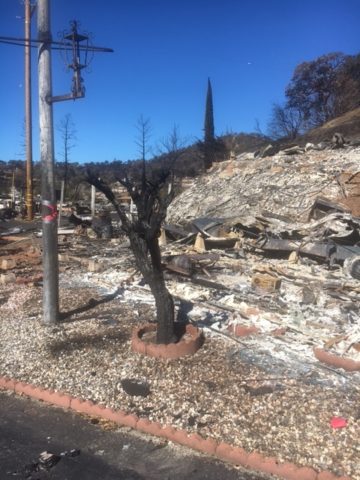
What’s really nice is that our behavioral health team has developed relationships with the California Office of Emergency Services and the other support services here, so they know to come to us if they think someone needs our help. The other day they pulled me over to speak with a homeless woman who had experienced some cognitive decline. It was really hard to navigate what she needed, so I helped them work with her. This morning another individual came in, an elderly woman who was having a difficult time putting together her sentences, and someone from the Office of Emergency Services asked if I would speak to her. We sat down together and I spoke really slowly with her, just following where she was going with her thoughts. I think she just really needed a calm environment and someone who was going to go at her pace and not ask too many questions—because when you come here, you’re going to get asked a thousand questions. Sometimes people need someone who will first let them talk. That’s what I did with her for about ten minutes. We were able to get to a place where she was ready to be taken around, so I walked her back to the case worker and we sat with her a little more. Now, she’s fully registered with social services, getting set up with assistance.
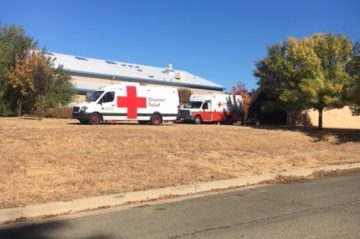
Following that, someone from one of the other agencies came up and said to me, “You guys have been so great—you make the clients feel so at home. It’s really wonderful that the Red Cross is here.” That’s so vital—this collaboration and communication between organizations. Nothing can happen if you don’t have that. Providing mental health support after a disaster is my passion. Ever since 9/11, I’ve seen the need for trained professionals to come in and help people with this type of shock, and I’m really grateful that I’ve had the opportunity to do it here. I’ve also met some awesome people from all over—West Virginia, North Carolina, North Dakota, Colorado—who came out here to drive the food trucks around, or help in a shelter. We’ve all developed a real bond with each other very quickly, because we’re all here to do the same thing.
